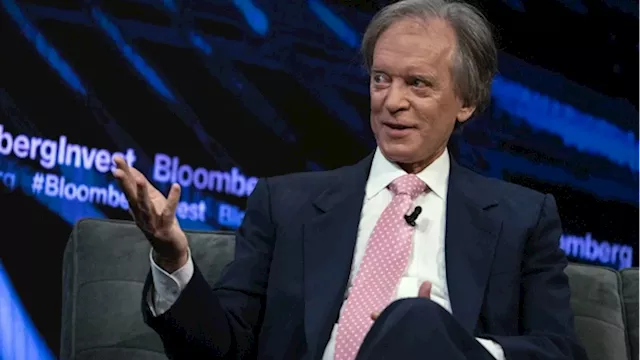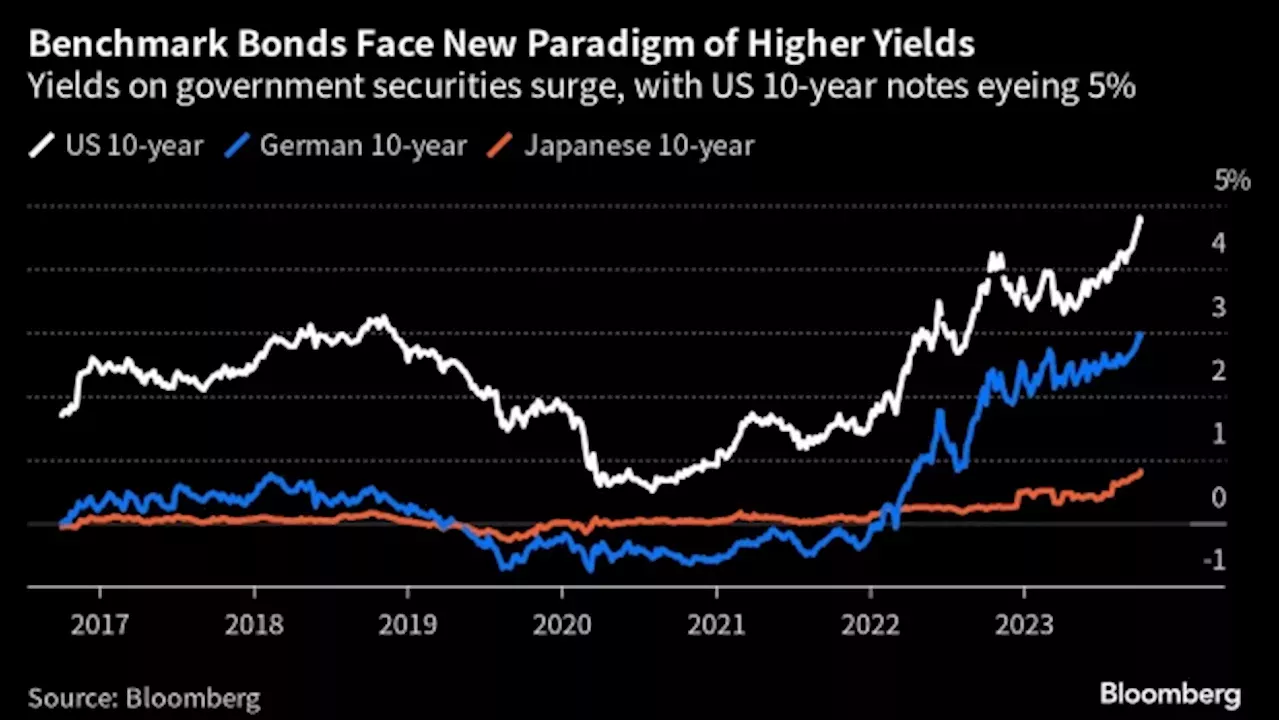Awareness still at disadvantage in decades-long battle for tennis pay equityWomen’s Tennis Is More Unpredictable — And Fun — Than Ever Going Into US OpenNFL revises gambling policy, reinstates Lions' Williams and two other suspended playersCurling Canada announces Montana’s as new sponsor of BrierSuspended Spanish soccer federation president Rubiales resigns after kiss scandal at World CupPegula appoints himself Sabres president, dissolves parent...
“I struggle to see how the recent yield moves don't increase the risk of an accident somewhere in the financial system given the relatively abrupt end over recent quarters of a near decade and a half where the authorities did everything they could to control yields,” said Jim Reid, a strategist at Deutsche Bank AG. “So, risky times.”
Finally, governments issued a lot more debt — at low rates — during the pandemic to safeguard their economies. Now they have to refinance that at a much costlier price, sowing concerns about unsustainable fiscal deficits. Political dysfunction and credit rating downgrades have added to the headwinds.
The mortgage-cost squeeze is a story playing out everywhere. In the US, the 30-year fixed rate has surpassed 7.5%, compared with about 3% in 2021. That more-than-doubling in rates means that, for a $500,000 mortgage, monthly payments are roughly $1,400 extra.Higher rates mean countries have to shell out more to borrow. In some cases, a lot more. In the 11 months through August, the interest bill on US government debt totaled $808 billion, up about $130 billion from the previous year.
Ultimately, as governments try to be more fiscally responsible, or at least give that impression, the burden falls on households. They’re likely to face higher taxes than otherwise along with suffering financially strained public services.US Treasuries are considered one of the safest investments on the planet, and in the last decade or so the rewards for holding them were modest given suppressed yields.
Such strains could mean corporates have to scale back investment plans or even look for savings, which may translate to job losses. Such actions, if widespread, would have implications for consumer spending, housing and economic growth. In the absence of cheap debt to help boost returns, some firms, including giants like KKR & Co., have been writing bigger equity checks to get deals done, while others have been opting for minority stake purchases. At the same time, PE firms have found it harder to sell assets, leading to delays in returning money to investors and impacting their ability to raise new funds.
While a broader turmoil could emerge from anywhere, it’s worth noting that property crises have frequently been the germ for a wider banking crisis.Lately, both bonds and stocks have been going down. That’s not ideal for defined-benefit pension funds that tend to use the classic 60/40 strategy, of 60% equities and 40% bonds.
Österreich Neuesten Nachrichten, Österreich Schlagzeilen
Similar News:Sie können auch ähnliche Nachrichten wie diese lesen, die wir aus anderen Nachrichtenquellen gesammelt haben.
 Bond market selloff: What to know for your portfolio, rate hikes, recession oddsSurging bond yields are reflecting longer-term expectations for elevated interest rates in financial markets, experts say. Here's what that means for your portfolio.
Bond market selloff: What to know for your portfolio, rate hikes, recession oddsSurging bond yields are reflecting longer-term expectations for elevated interest rates in financial markets, experts say. Here's what that means for your portfolio.
Weiterlesen »
 Trading Game Plan: Nasdaq master levels, Bitcoin trades, and bond market collapse - October 05, 2023itemprop=description content=
Trading Game Plan: Nasdaq master levels, Bitcoin trades, and bond market collapse - October 05, 2023itemprop=description content=
Weiterlesen »
 Bond Market a ‘Little Oversold’ After ETF Pullout, Bill Gross Says - BNN BloombergRetail investors in exchange-traded funds have joined the ranks of “bond vigilantes” and their sharp pullout last week led to an oversold market, said Bill Gross, co-founder and former chief investment officer at Pacific Investment Management Co.
Bond Market a ‘Little Oversold’ After ETF Pullout, Bill Gross Says - BNN BloombergRetail investors in exchange-traded funds have joined the ranks of “bond vigilantes” and their sharp pullout last week led to an oversold market, said Bill Gross, co-founder and former chief investment officer at Pacific Investment Management Co.
Weiterlesen »
 Wild Week for Bond Market Spurs Record Trading Frenzy in ETFs - BNN BloombergBill Gross is right: bond ETF activity has been frenzied in the grip of Wall Street turmoil.
Wild Week for Bond Market Spurs Record Trading Frenzy in ETFs - BNN BloombergBill Gross is right: bond ETF activity has been frenzied in the grip of Wall Street turmoil.
Weiterlesen »
